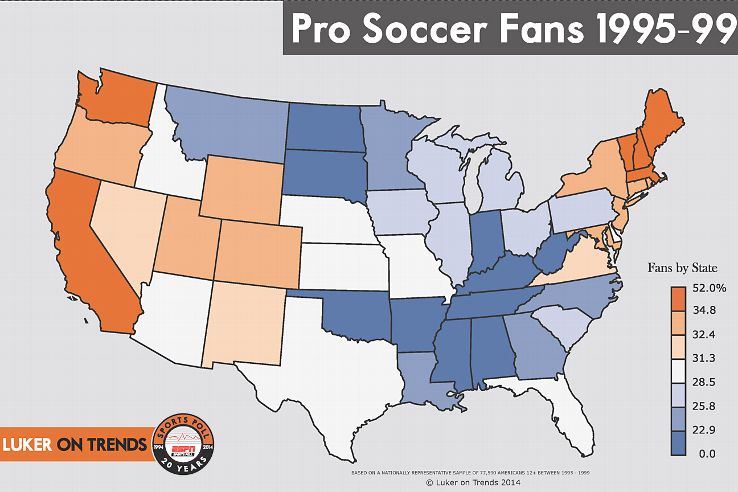The United States won the World Cup this summer. To my eternal regret, this victory took place off the field, not on it. The 2014 World Cup television audiences have risen 45 percent over 2010 and 124 percent over 2006. The telecast of the United States' 2-2 tie against Portugal became the most viewed soccer match in the United States ever, averaging 18.22 million viewers and trumping even the sports-bra-busting dramatics of the 1999 Women's World Cup final.
The scenes on the ground have been just as dramatic. Intercut into every U.S. game broadcast has been staggering live scenes from Chicago, Kansas City, Dallas and San Diego, as public spaces have palpitated with football-loving Americans and the entire nation has resembled the Portland Timbers' stadium on gameday.
For longtime football fans, the micro-scenes have been just as heartwarming. At Men In Blazers, we have been sent such dizzying images of Texan gun fairs and Chattanooga hardware stores being infiltrated by football.
The world has noticed. "What we see in the United States is staggering," FIFA secretary general Jerome Valcke recently said.
Yet tides roll in and tides roll out. Has the United States truly fallen in love with football or just the World Cup in a friendlier time slot? Is the unprecedented exuberance we have witnessed around our game long-lasting or, like that for pogo sticks and hula hoops, is it a mere fad?
To gain a sense of perspective, I turned to Rich Luker, the founder of the ESPN Sports Poll Annual Report managed by Luker on Trends, which monitors the nation's interest in 31 different sports.
Luker sent me two heat maps of the United States. One etched with Americans who self-identified as "pro-soccer fans" in the wake of the 1994 World Cup, which was giddily hosted on home turf. The second tracked that growth around the 2010 tournament (by which time pro soccer also included MLS).
"If you look at the period after 1994, you would expect to see accelerated growth, but in truth, the tournament did not do a lot to spark the sport's popularity in the United States," Luker said. "The growth numbers are just not there in the same way as they would have been for NASCAR, poker or mixed martial arts, which blew up with their television contracts. The 1994 World Cup was big all over the country at the time, but soccer did not register in 1995."
Two decades later and the heat maps tell a different story. "Huge shifts are in evidence here regionally," Luker explained. "In 1995, the audience was largely blue collar and in the Northeast but it has shifted south and west, become much higher income, and when you drill down and look at the demographics, you learn the avid fan base between ages 18-24 and 25-34 have grown two and a half times."


In Luker's mind, The drivers of this growth are multifaceted. "This is the first full generation to come of age with MLS being in existence," he said. "The best soccer from around the world is now widely available and easily accessibly on television, which has increased the profile of the [elite leagues'] star players."
That growth has been noted. We live in a land in which advertisers are salivating at the sport's ability to deliver the young, male demographic they covet and where ratings for the English Premier League have soared, building a passionate, educated, football-savvy American audience at the core of the World Cup boom. Vancouver-based games developer EA Sports continues to act as an invisible hand in the sport's momentum as its FIFA franchise has surged since 2010, becoming the third-biggest sports game in North America, subtly sensitizing a generation of young Americans to both tactics and personalities. Premier League clubs -- five of which are controlled by Americans -- have responded in kind, targeting the United States as a top-two or -three growth area for their brand-building strategies.
When the United States was awarded the 1994 World Cup on July 4, 1988, U.S. Rep. Jack Kemp, a former pro quarterback, took to the floor of Congress to defend America's honor: "I think it is important for all those young men out there who someday hope to play real football where you throw it and kick it and run with it and put it in your hands, that distinction be made that football is democratic capitalism whereas soccer is a European socialist sport."
After the summer we are experiencing, and the avid fan base that has been gradually established, even the late Kemp would agree, soccer -- so long this nation's sport of the future -- has finally become a major American ball sport.
No comments:
Post a Comment